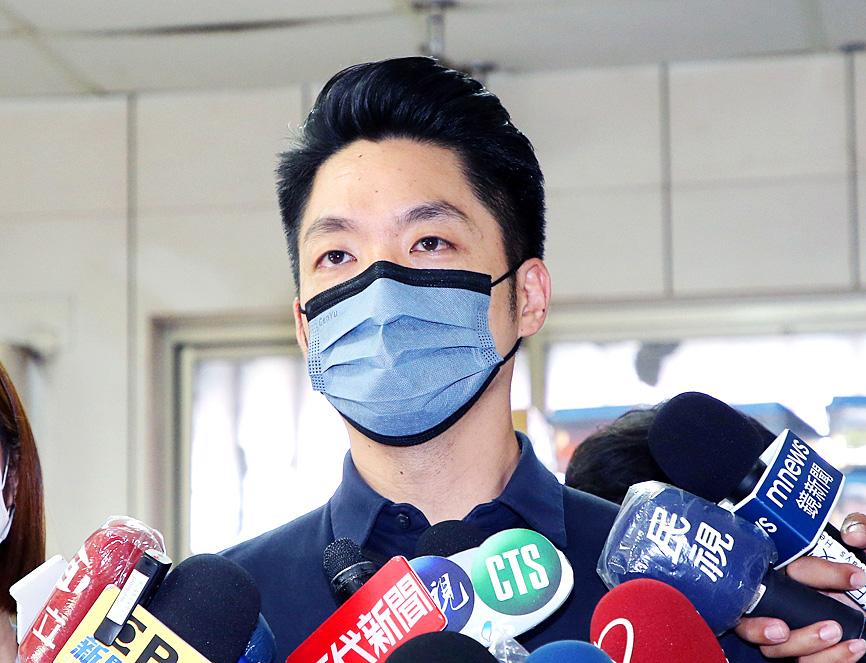A Chinese Nationalist Party (KMT) delegation visiting China has continued to spark controversy, with politicians within and outside the party saying the group is raising funds from Taiwanese businesspeople there for the Nov. 26 local elections.
KMT Taipei City Councilor Lee Ming-hsien (李明賢) said he has from the very start opposed the visit by the delegation, led by KMT Vice Chairman Andrew Hsia (夏立言), and has heard talk within the party that the group has been mandated to solicit donations from the Taiwanese community.
However, “the more money Hsia gets during the visit, the more votes our party will lose at the grassroots level,” Lee said.

Photo: CNA
Democratic Progressive Party (DPP) Legislator Liu Chao-hao (劉櫂豪) said he has also heard the same rumor in political circles and understands a party’s need to procure funding, but “any political party must differentiate where it is getting the donation from and what price it has to pay for it.”
Local media reports have also cited KMT officials, speaking on condition of anonymity, as saying the same thing.
“In the recent elections, the pan-blue camp was short of funds and had difficulty running campaigns. This is why we need a top official — such as a vice chairman — to engage and interact with Taiwanese businesspeople in China,” a KMT official said.
“If he is successful in procuring more funds, it would really help in this coming election, which involves city mayors, county commissioners and local councilors. For our party, this would be life-saving money to raise our chances of winning,” the official said.
Other media reports quoted KMT members as saying that the party’s priority is to secure wins for the mayoral contests in the six special municipalities by providing financial and other campaign resources, with the most important goal being to help KMT Legislator Chiang Wan-an (蔣萬安) win the Taipei mayoral race.
Asked about the reports while canvassing votes in Taipei, Chiang said that to his knowledge, the delegation’s visit “is to find the problems and difficulties facing Taiwanese businesspeople, students and entrepreneurs in China.”
Taiwan Thinktank member Tung Li-wen (董立文), a DPP member, said that if the reports are true, it could be a violation of the Political Donations Act (政治獻金法), which says Taiwanese are eligible to donate and contribute funds to political parties for campaigning activities, but there are key restrictions and prohibitions on the sources of funding.
Tung said the delegation would meet with Taiwanese businesspeople, but they are being monitored by China’s Taiwan Affairs Office and other Chinese officials.
“It is the Chinese side that must approve and give the green light to certain Taiwanese business figures in China on donating election funds to the KMT,” he said.

Taiwan has received more than US$70 million in royalties as of the end of last year from developing the F-16V jet as countries worldwide purchase or upgrade to this popular model, government and military officials said on Saturday. Taiwan funded the development of the F-16V jet and ended up the sole investor as other countries withdrew from the program. Now the F-16V is increasingly popular and countries must pay Taiwan a percentage in royalties when they purchase new F-16V aircraft or upgrade older F-16 models. The next five years are expected to be the peak for these royalties, with Taiwan potentially earning

STAY IN YOUR LANE: As the US and Israel attack Iran, the ministry has warned China not to overstep by including Taiwanese citizens in its evacuation orders The Ministry of Foreign Affairs (MOFA) yesterday rebuked a statement by China’s embassy in Israel that it would evacuate Taiwanese holders of Chinese travel documents from Israel amid the latter’s escalating conflict with Iran. Tensions have risen across the Middle East in the wake of US and Israeli airstrikes on Iran beginning Saturday. China subsequently issued an evacuation notice for its citizens. In a news release, the Chinese embassy in Israel said holders of “Taiwan compatriot permits (台胞證)” issued to Taiwanese nationals by Chinese authorities for travel to China — could register for evacuation to Egypt. In Taipei, the ministry yesterday said Taiwan

‘LIKE-MINDED PARTNER’: Tako van Popta said it would be inappropriate to delay signing the deal with Taiwan because of China, adding he would promote the issue Canadian senators have stressed Taiwan’s importance for international trade and expressed enthusiasm for ensuring the Taiwan-Canada trade cooperation framework agreement is implemented this year. Representative to Canada Harry Tseng (曾厚仁) in an interview with the Central News Agency (CNA) said he was increasingly uneasy about Ottawa’s delays in signing the agreement, especially as Ottawa has warmed toward Beijing. There are “no negotiations left. Not only [is it] initialed, we have three versions of the text ready: English, French and Mandarin,” Tseng said. “That tells you how close we are to the final signature.” Tseng said that he hoped Canadian Prime Minister Mark Carney

The US’ joint strikes with Israel on Iran dismantled a key pillar of China’s regional strategy, removing an important piece in Beijing’s potential Taiwan Strait scenario, said Zineb Riboua, a senior researcher at the Hudson Institute’s Center for Middle East Peace and Security. In an article titled: “The Iran Question Is All About China,” Riboua said that understanding the Iran issue in the context of China’s “grand strategy” is essential to fully grasp the complexity of the situation. Beijing has spent billions of dollars over the years turning Iran into a “structural strategic asset,” diverting US military resources in the